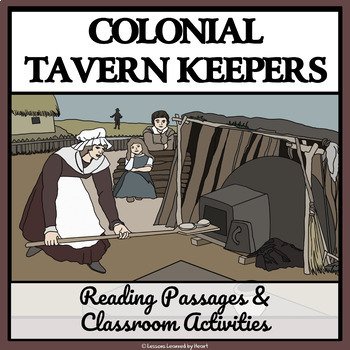

One, related by Rebecca Leach Dozier in her history of Littleton and credited to an ex-slave called "Mammy Lissa," describes a Revolution-era duel between a Whig named Drugger and a Tory named Drumghould, wherein Drugger eventually kills his opponent over a political insult. Stories of duels surround the early history of the ordinary. The small frame building served for several generations as a way-station to travelers on the "high" or "stage-coach" road between Hillsborough and the town of Halifax.

Person's Ordinary, in the present-day town of Littleton, was originally licensed to Thomas Person in 1764 and again to William Person Little in 1820. Its structure, which is currently a museum located next to a full-service restaurant, dates to 1784, when it was reconstructed after an earlier wooden tavern burned to the ground. Perhaps North Carolina's most famous colonial tavern is Salem Tavern, located in the heart of Old Salem. Taverns that doubled as ferry (and later, stage) stops and inns that housed general merchandise stores were popular combinations. With a built-in local customer base, tavern keepers frequently branched out into auxiliary economic endeavors to provide other services for their customers and make a larger profit. Tavern keepers adhered to strictly enforced laws requiring them to post their rates for meals, beverages (especially liquor and spirits), and some services. They were also widely considered elixirs with great medicinal value, effective against symptoms of viruses, nervous conditions, and other ailments. The drinks' potency and warmth, and the addition of nutmeg or other spices, made toddies particularly welcome in colder months. Many well-known eighteenth-century establishments regularly served liquor-based toddies to weary patrons in need of relaxation after a long day of difficult travel. Various wines, beers, hard ciders, and exotic punches were standard offerings on the drink menus of early North Carolina taverns and public houses. Not surprisingly, many female travelers avoided sleeping or eating at public inns in favor of private homes. Travelers staying the night might find themselves sharing a bed with two or three others, if they were lucky enough to get a bed at all. While colonial law required innkeepers to provide suitable lodgings at a reasonable price, exactly what constituted "suitable" was always in question. Consequently, inns and taverns provided a variety of goods and services, from meals and liquor to overnight accommodations.
#Colonial times tavern keeper full#
These establishments-also known as "ordinaries" in eighteenth-century America because they often catered to the full spectrum of social classes-were frequently one of the first businesses to appear in newly designated county seats, offering food and lodging to travelers and visitors to court. Inns and taverns played an important role in the economic and geographic development of colonial North Carolina.


 0 kommentar(er)
0 kommentar(er)
